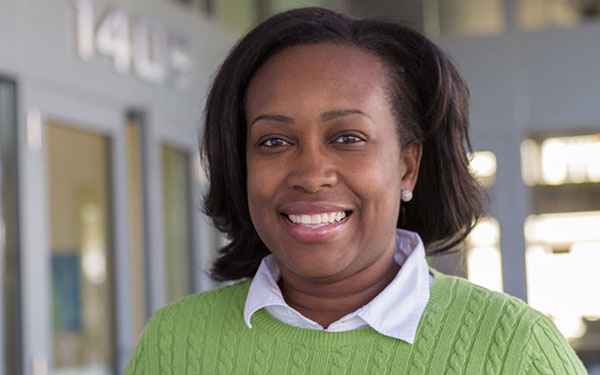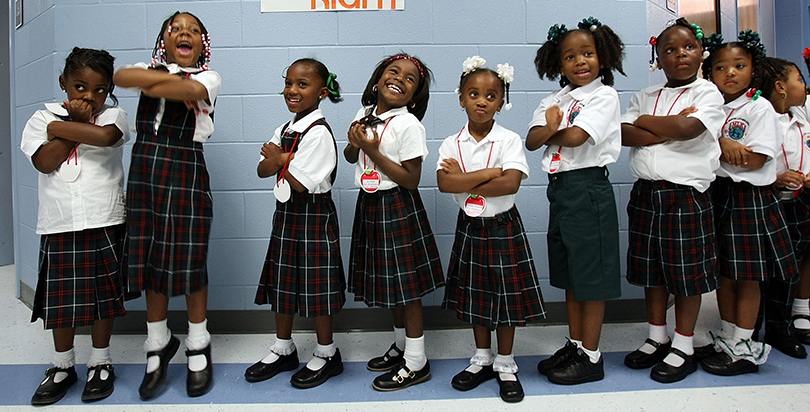(New Orleans, Louisiana)
Louisiana state lawmakers voted unanimously to return New Orleans public schools to local control but there remains deep ambivalence about whether that will erode gains made over the past 10 years.
“There's many opinions about what return means. Some people feel it's a spiral back to the problems we had before and some people think it's the greatest thing since apple pie,” said Vera Triplett. “And I'm somewhere in the middle of those two.”
Triplett, who was born and raised in New Orleans, began her career as a teacher in the pre-Katrina public school system and has since gone on to serve as an administrator in the Recovery School District and as CEO of a local charter network.

Vera Triplett
Her hesitancy about the return plan stems from a fear that the school system would begin a slide back towards the dysfunction that she experienced as a teacher in the years before Hurricane Katrina.
“Prior to the reforms, we were graduating kids from high school who couldn't read or write,” Triplett said. “It just wasn’t that we weren’t educating students well, in many cases, we weren’t educating students at all.”
The Senate bill has the backing of key figures in New Orleans’ education reform community and Gov. John Bel Edwards, who has been a vocal critic of charter schools, is expected to sign it in the coming weeks.
(The 74: Louisiana Turns the Page: 11 Years after Katrina, New Orleans Schools Set to Return to Local Control)
It establishes a plan to hand over control of all Recovery School District (RSD) charters to the Orleans Public School Board (OPSB) by July 1, 2018. Between now and then, an advisory committee comprised of RSD and OPSB officials will be tasked with hammering out the details of the transfer.
Up to now, RSD charters have had the power to decide whether to return to the Orleans Parish School Board or remain with the RSD, but only one school has voluntarily chosen to go back in the past 10 years.
Local control’s re-emergence comes more than 10 years after state lawmakers directed the Recovery School District to take over nearly all of the city’s schools from OPSB in the wake of Katrina.
Prior to the storm, the school system was mired in a series of corruption scandals, teetering on the brink of insolvency, and was widely considered one of the worst districts in the country.
In the intervening decade, the RSD embarked on a radically new approach to urban public education. School officials abolished geographic attendance zones, established a citywide enrollment system, and embraced charter schools, becoming the nation’s first all-charter school district in 2014.
The impact of these changes on student achievement has been substantial. Standardized test scores, graduation rates, and college acceptance numbers have all markedly improved over the past 10 years.
“We are not aware of any other districts that have made such large improvements in such a short time,” Douglas Harris, an economist and director of Education Research at Tulane University wrote in a recent study on the effects of the reforms.
However, this progress has not come without controversy. The state takeover, along with the layoffs of over 7,000 district employees by the local school board, fueled a perception among some community members that the effort was part of a broader plan to disenfranchise the city’s African-American majority.
As a result, the takeover has remained a lingering source of resentment over the years, as a small, but vocal group of activists has continued to demand that the state return schools to local control.
But now that return is imminent, a poll conducted in April by the Cowen Institute for Public Education Initiatives at Tulane University showed just how conflicted citizens are.
While the survey revealed broad support for RSD reforms implemented over the past decade, there is little consensus about what should happen next.
“Support for reform policies such as open enrollment and charter schools has consistently been high across all demographic groups,” said Vincent Rossmeier, the Cowen Institute’s director of policy.
Sixty-three percent of poll respondents agreed that charter schools have improved public education in New Orleans and 75 percent approved of the city’s open-enrollment policy.
On the other hand, Rossmeier points out that, “The public seems uncertain, or unclear about the best path forward as to when or if all RSD schools should return.”
Only 38 percent of respondents agreed schools should return to local control by 2018, while 32 percent wanted to retain the current policy, in which schools decide individually whether to return.
Much of the reluctance has been due to concerns that the school board might begin to erode the autonomy that charters have enjoyed under state oversight. Furthermore, OPSB has been slow to embrace the policies that the RSD has established to ensure equitable access to schools, such as the district’s unified enrollment process and expulsion hearing system.
“The RSD has not only demonstrated a commitment to providing equitable access to schools, but has continually looked for the next intervention that will meet the needs of the most vulnerable kids in our city,” said Michael Stone, co-CEO of New Schools for New Orleans, a local nonprofit that supports the city’s charter schools.
Meanwhile, Stone notes, “OPSB has either been apathetic about those issues or was brought into those conversations kicking and screaming.”
Dana Henry, New Orleans director of Stand For Children, an advocacy group that supports the Senate bill, said charters leaders and reform advocates were willing to get behind the current return legislation because it essentially codifies the status quo.
“I think it's very comprehensive and well thought-out in terms of making sure that the issues and concerns that charter operators have and the community have are addressed in the bill,” he said. “The autonomy and flexibility that schools currently enjoy under the RSD will still be in place under OPSB.”
As such, charters will retain decision-making power over nearly all aspects of programming, hiring and firing, and day-to-day operations. The bill also requires the Orleans Parish School Board to maintain the existing common enrollment and expulsion systems, as well the RSD’s innovative school funding model, which which allocates additional funds to schools serving at-risk and special needs students.
Those safeguards, Henry says, helped convince “operators, parents, advocacy organizations, and community stakeholders that this is not a shotgun marriage."
For her part, Triplett, the former New Orleans teacher who became a charter network CEO, sees a benefit, hoping the district’s pending reunification will allow the community to shift its attention to the work that still needs to be done in schools.
“We haven't been having conversations that we need to have about the issues that are still holding students back,” she said, “because on the reform side, we've always been on the defensive.”
Get stories like these delivered straight to your inbox. Sign up for The 74 Newsletter


;)